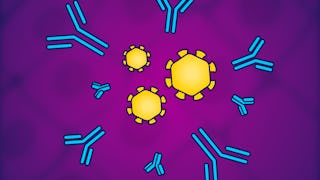Filter by
SubjectRequired
LanguageRequired
The language used throughout the course, in both instruction and assessments.
Learning ProductRequired
LevelRequired
DurationRequired
SkillsRequired
SubtitlesRequired
EducatorRequired
Explore the Allergy Course Catalog
 Status: Free Trial
Status: Free TrialImperial College London
Skills you'll gain: Immunology, Hematology, Chronic Diseases, Pulmonology, Physiology, Infectious Diseases, Pathology
 Status: Free Trial
Status: Free TrialImperial College London
Skills you'll gain: Immunology, Physiology, Geriatrics, Infectious Diseases, Biology, Cell Biology, Molecular Biology
 Status: NewStatus: Free Trial
Status: NewStatus: Free TrialUniversity of Illinois Urbana-Champaign
Skills you'll gain: Maternal Health, Child Health, Anatomy, Endocrinology, Immunology, Infant Care, Preventative Care, Nutrition and Diet, Biochemistry, Nutrition Education, Production Process, Biology, Molecular, Cellular, and Microbiology
 Status: Preview
Status: PreviewThe University of North Carolina at Chapel Hill
Skills you'll gain: Epidemiology, Public Health, Infectious Diseases, Research Design, Community Health, Health Policy, Research Methodologies, Social Determinants Of Health, Science and Research, Statistical Analysis, Chronic Diseases
 Status: Free Trial
Status: Free TrialRice University
Skills you'll gain: Medical Terminology, Medical History Documentation, Pulmonology, Cardiology, Electronic Medical Record System, Medical Records, Endocrinology, Human Musculoskeletal System, Orthopedics, Obstetrics And Gynecology, Neurology, Gynecology, Urology, Hematology, Anatomy, Immunology, Diagnostic Tests, Patient Treatment, Physiology, Communication
 Status: Free Trial
Status: Free TrialRice University
Skills you'll gain: Human Musculoskeletal System, Anatomy, Endocrinology, Orthopedics, Kinesiology, Physiology, Neurology, Medical Terminology, Cell Biology, Biology, Chemistry, Clinical Practices, Sports Medicine, Physical Therapy, Molecular, Cellular, and Microbiology, Life Sciences, Lifelong Learning
What brings you to Coursera today?
 Status: Free Trial
Status: Free TrialUniversity of Colorado System
Skills you'll gain: Autism Spectrum Disorders, Individualized Education Programs (IEP), Special Education, Nutrition Education, Community Health, School Psychology, Chronic Diseases, Case Studies, Student Support and Services, Nutrition and Diet, Health Education, Health Promotion, Public Health, Mental and Behavioral Health Specialties, Parent Communication, Care Management, Communication Disorders, Neurology, Child Health, Behavioral Health
 Status: Free Trial
Status: Free TrialRice University
Skills you'll gain: Immunology, Public Health, Infectious Diseases, Anatomy, Preventative Care, Molecular Biology, Chronic Diseases, Physiology, Hematology, Medical Terminology, Oncology, Microbiology, Cell Biology, Biochemistry, Pathology, Drug Development, Diagnostic Tests, Pharmacology, Biology
 Status: Free Trial
Status: Free TrialImperial College London
Skills you'll gain: Immunology, Infectious Diseases, Hematology, Physiology, Oncology, Microbiology, Molecular, Cellular, and Microbiology, Epidemiology, Internal Medicine, Chronic Diseases, Public Health and Disease Prevention, Geriatrics, Pathology, Pulmonology, Environment, Pharmacotherapy, Biology, Public Health, Molecular Biology, Cell Biology
 Status: Free Trial
Status: Free TrialRice University
Skills you'll gain: Pulmonology, Obstetrics And Gynecology, Respiration, Anatomy, Urology, Cardiology, Urinalysis, Patient Evaluation, Immunology, Hematology, Hemodynamics, Nephrology, Capillary, Gynecology, Physiology, Pathology, Clinical Nutrition, Medical Terminology, Biology, Lifelong Learning
 Status: Free Trial
Status: Free TrialUniversity of Colorado System
Skills you'll gain: Splinting, Patient Evaluation, Trauma Care, Medical Emergency, Sanitation, Emergency Medicine, Neurology, First Aid, Patient Positioning, Patient Transport, Wound Care, Emergency Medical Services, Patient Treatment, Safety Assurance, Clinical Assessment, Environment Health And Safety, Triage, Acute Care, Emergency Response, Vital Signs
 Status: Free Trial
Status: Free TrialRice University
Skills you'll gain: Basic Electrical Systems, Electrical Engineering, Torque (Physics), Physics, Electrical Systems, Engineering Analysis, Electronic Components, Mechanics, Electronic Systems, Mathematical Modeling, Applied Mathematics, Engineering Calculations, Problem Solving, Calculus, Advanced Mathematics, Trigonometry
Allergy learners also search
In summary, here are 10 of our most popular allergy courses
- Immunology: Autoimmunity, Allergy, and Transplants: Imperial College London
- Immunology: Adaptive Immune System: Imperial College London
- Discovering Dairy: What's in Your Milk?: University of Illinois Urbana-Champaign
- Epidemiology: The Basic Science of Public Health: The University of North Carolina at Chapel Hill
- Medical Terminology: Rice University
- Human Anatomy & Physiology I: Rice University
- School Health for Children and Adolescents: University of Colorado System
- Fundamentals of Immunology: Rice University
- Immunology: The Immune System and its Failures: Imperial College London
- Human Anatomy & Physiology II: Rice University










